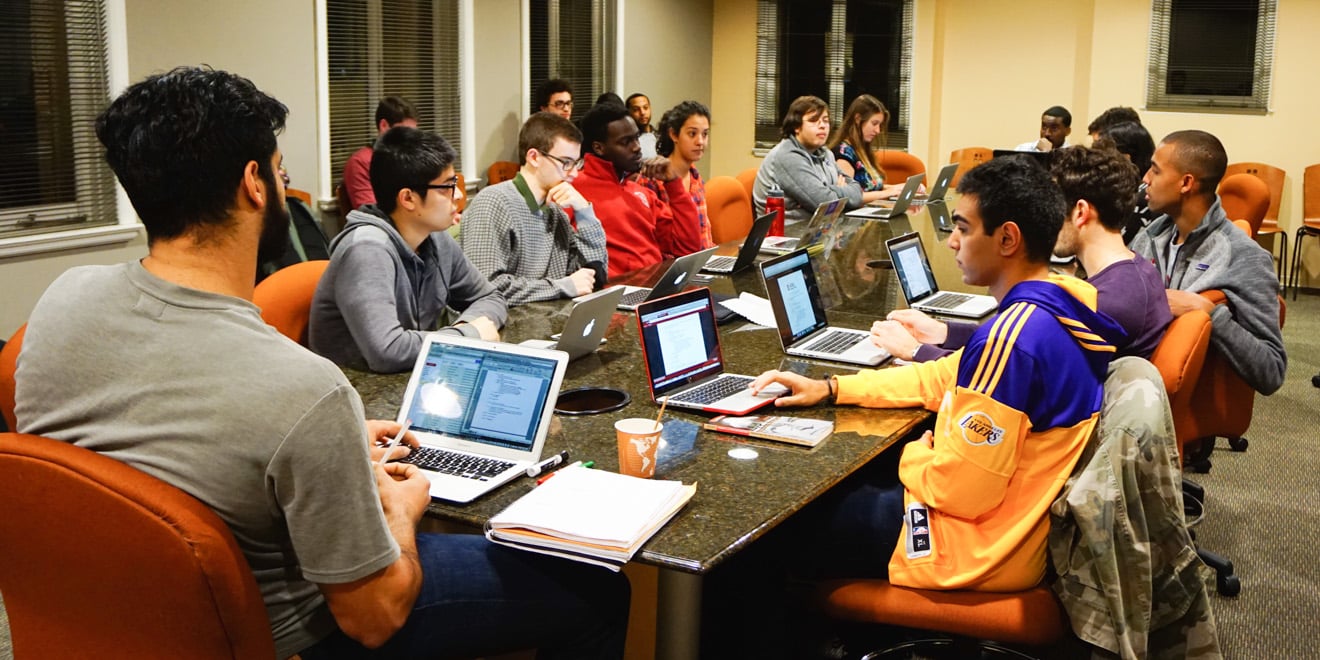The 22nd meeting of the Undergraduate Senate saw Senators discuss new guidelines on budget reallocation for clubs, as well as an initiative to distribute food funds to lower-income students staying on campus over spring break.
The ASSU also amended last week’s bill to fund the Stanford News Readership Program’s efforts to provide free copies of The New York Times and approved funding requests.
Project on food funds
Jasmin Espinosa ’16 discussed her personal project to seek food funds for students who may not be able to afford food on campus over spring break.
“Since last year, I’ve been working on this project, but haven’t been able to get through some of the bumps previous Senators have encountered while working with the University,” Espinosa said. “For this spring break, we’re looking at a short-term solution, with funds from the Diversity and First-Gen Office (DGen) and the ASSU’s discretionary funds.”
She calculated that one student would need $10 per meal over seven days of dining hall closure, amounting to about $9,000 to fund 64 students.
In response to questions about how the numbers were derived, Espinosa said, “This is a pilot program because about 700 students identify as low-income, and we know that less than half stay on campus, but not the exact number. This is a way to see how many students need assistance based on the requests we receive.”
Uncertain numbers and limited funds mean the DGen office will have to assess applicants’ needs before distributing the money, likely via a visa card system.
The response from the Senate was enthusiastic, though some raised concerns over accountability.
Sean Means ’18 suggested, “Should students have to submit receipts to make sure that the money is spent on food? I think there should be some accountability, just like any other use of funds. This is especially if we’re not able to cover everybody.”
Eric Brown ’16 disputed the idea, describing receipt collection as “rather paternalistic.” Amid general support for the project, the Senate deferred discussion of details to committee meetings.
In the meantime, Espinosa plans to seek out community organizations such as the Women’s Community Center and the First-Generation Low-Income Partnership (FLIP) for further funds.
Bill to revise by-laws on club budget modification
Luka Fatuesi ’17 authored the measures in a new bill to fix a loophole in budget reallocation procedure.
Explaining the motivation behind the resolution, Fatuesi said, “One club asked for a large sum of money to bring a famous artist to campus during spring elections. It fell through, and when they came to us to request that the money be split over several smaller events, we became concerned that there were no guidelines on how budget should be allocated in these situations.”
Appropriations Chair Justice Tention ’18 voiced his support for the bill.
“I fully endorse this,” Tention said. “I think this event slipped through lots of existing gates.”
However, Brown doubted the feasibility of by-law changes in regulating fund reallocation.
“Although I agree with the policy, in terms of practicality, I can only say that the money has already been allocated, and we don’t want it to be wasted either,” he said.
Fatuesi concluded by saying that the Senate could make exceptions to any fund reallocation by-laws case by case, without discounting the need for concrete guidelines in the by-laws.
Funding print editions of The New York Times
The bill to fund the distribution of The New York Times through the Stanford News Readership Program (SNRP) was up for discussion once more. Hattie Gawande ’18 proposed an amendment to the language, clarifying that SNRP student leaders would be executors of the funds, rather than recipients.
Other Senators noted that students had responded well to the initiative, and they said they hoped the amendment would pave the way for the bill to be passed.
Finally, the Senate approved additional funding for the Bitcoin Club, and voted to include the Jazz Consortium on the upcoming funding ballot.
Contact Fangzhou Liu at fzliu96 ‘at’ stanford.edu.
